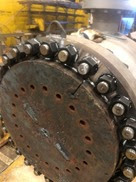Essential Workshop Tools to Boost Productivity and Safety in Industrial Bolting
Essential Workshop Tools to Boost Productivity and Safety in Industrial Bolting
Engineers at maintenance shops & factories may not have the same access to industrial bolting tools as their counterparts on oil rigs, wind farms, and pipelines.
Which resources meet their requirements best? And what advantages do they have?
Let's examine a few tools that are useful in the factory and the workshop -
Hydraulic Presses
When it comes to punching, hammering, blanking, bending, & moulding, hydraulic presses shine.
Hydraulic Jacks can be either aluminium cylinder or steel cylinder, which are at the heart of their operations to lift anything. Hydraulic jacks are one of the best tools in the workshop for heavy equipment lifting and are compact enough for transportation.
Hydraulic jacks may be employed for the following jobs:
Metal press work (to press sheet metal to any required shape).
Drawing and pushing rods.
Bending and straightening any metal piece .
Packing press.
Hydraulic Jacks are the safest tool in one’s workshop if you use it as per instruction.
Pullers
In various contexts, pullers are required to remove components placed on a shaft.
Technicians in locations like auto repair shops utilise smaller pullers, whereas businesses like power generation, aviation, rail, shipyards, paper factories, & mining use bigger, higher tonnage ones.
Load Skates
The purpose of load skates is obvious, like a rollerblade, but much faster and more stable. They can support bulky things during transportation from one area of a workshop to another. (Such as while rearranging tools on the factory floor.)
Pipe flange separation is a typical use for a spreader. In addition to its use in the pipeline industry, spreading wedges are also quite helpful in making the crucial initial move while hoisting big objects. The tip of the flange spreader just needs a few millimetres of clearance, and you only need adequate support on both surfaces. Using a flange spreader to make some room, you can lower the load onto such a load skate.
Portable and indispensable, hydraulic cylinders can be used for various purposes. You may count on a cylinder available for each situation where you'd like to press, pull, pinch, punch, imprint, press, or hold something in place.
There are a wide variety of models to choose from, even some that are too big to fit in a small location, such as those used in a workshop. Think of 'pancake cylinders,' which are short in height, and multi-stage telescopic cylinders,' which are also short in height but have a longer stroke.
Hydraulic Pumps
In many modern factories, the machinery used for holding down jobs uses hydraulics. A dedicated pump can be installed when such a system does not exist or if additional hydraulic pressure is required.
Compressed air or energy is used to power these permanently installed hydraulic pumps.
Types driven by workshop air are ideal for light to moderate use.
It is advised to use electrically powered pumps for heavy-duty cycles and automated processes. They are incredibly adaptable, and reliable, and they offer top-tier performance & longevity.
Professionals working on oil & gas pipelines need access to hydraulic torque wrenches . However, they are also helpful for people who work in repair shops. The hydraulic and pneumatic varieties can use various cassette or socket sizes.
Some, like the HMT-Series, can be used with cassettes from other manufacturers. This freedom from dependence on a single vendor is a significant benefit. Great news if you’re searching for a cost-effective manner to improve your inventory of techniques!
Bolt Tensioners
To tighten an adjustable wrench, you can use a hydraulic bolt tensioner, a type of annular jack. When tightening a bolt, a jack is used to apply pressure to the joint and draw on the bolt's head. Hence the bolt must be at least one inch longer.
Flangers
The flanger combines two identical audio signals, one of which is played at a slightly slower tempo. It's as if two tape players were playing the same tape at different speeds, giving the impression that there were two players.
Conclusion
Thus far, we have discussed the many tools used in a workshop. Pressure gauges, gauge connectors, hoses, combiners, & hydraulic oil are all essential parts of a hydraulic system that should be included in your next tool purchase. When you have a supply of them at hand, you can tackle any maintenance problem on the spot.
Content Sources :- ABSGroup



Comments
Post a Comment